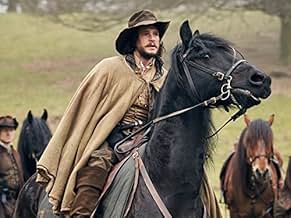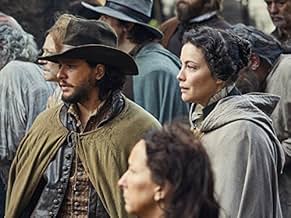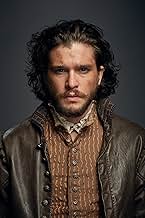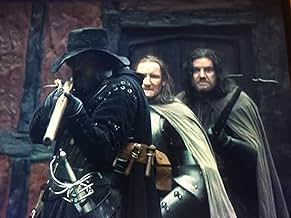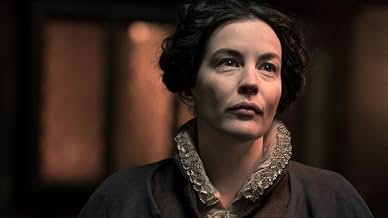Aggiungi una trama nella tua linguaRobert Catesby leads Guy Fawkes a group of English Catholic traitors plan to blow up the Palace Of Westminster and kill King James I in the infamous Gunpowder Plot.Robert Catesby leads Guy Fawkes a group of English Catholic traitors plan to blow up the Palace Of Westminster and kill King James I in the infamous Gunpowder Plot.Robert Catesby leads Guy Fawkes a group of English Catholic traitors plan to blow up the Palace Of Westminster and kill King James I in the infamous Gunpowder Plot.
- Nominato ai 1 BAFTA Award
- 4 candidature totali
Sfoglia gli episodi
Recensioni in evidenza
This three-part BBC dramatisation of the events surrounding the Gunpowder Plot of 1605 was something of a mixed bag. There was the expected attention to period detail in the sets and costumes and the acting too was good in almost every major part. However, historical accuracy was blown to smithereens in places and other aspects of the story were undoubtedly "sexed up" to make for presumably more exciting viewing in this day and age.
It was also a tough watch at times with graphic depictions of torture and execution, the latter in particular where in the first episode we see a middle-aged Catholic woman stripped naked and agonisingly crushed to death followed by a young priest hung, drawn and quartered, his entrails ripped from his still-living body, before his beheading and his severed head is stuck on a pike put on public display. All of this before a baying, bloodthirsty crowd of supposedly ordinary people.
The story centres on young Catholic nobleman Robert Catesby who becomes the centre of a Popish plot to strike back against the ever more repressive anti-Catholic legislation put before King James by his first lieutenant, the hunch-backed Robert Cecil and his hired muscle in the person of Sir William Wade. With his cohorts, Catesby, after failing to get support abroad for his plans, hatches the famous gunpowder plot to blow up the king and his ministers on the opening of Parliament which sees him meet up with one Guy Fawkes, a cold-bloodedly determined confederate.
Kit Harington, whose very name seems apt for the time portrayed, plays Catesby as the determined handsome hero, prepared to martyr himself to the cause. Peter Mullen is the priest whose commitment to the cause is racked by self-doubt but who in the end, inspired by Catesby's example, finds his own inner courage to match his convictions. Mark Gatiss plays the ruthless, scheming Cecil as almost a pantomime villain with Shaun Dooley more impressive as the brutal Wade, happy to follow orders no matter how violent they are. King James's homosexual tendencies are rather unsubtly highlighted as he plays up to his young lover at court, before his narrow escape frightens him back to his queen.
To me though the story was over-egged in that for example, nowhere have I read of Catesby freeing another young Catholic priest from the Tower Of London, shown here in almost medieval "Mission Impossible" style and as for the last stand of Catesby and his followers, his "Butch Cassidy" - type slow motion death seemed likewise over the top.
I just think that historically important stories like this should pay more attention to the truth and not make so many concessions to an audience it thinks needs cliff-hanging thrills and contrived action sequences in the name of entertainment. The Gunpowder Plot was a pivotal moment in British history and I think deserved a more factual retelling than it got here, no matter how well acted and re-enacted it otherwise was.
It was also a tough watch at times with graphic depictions of torture and execution, the latter in particular where in the first episode we see a middle-aged Catholic woman stripped naked and agonisingly crushed to death followed by a young priest hung, drawn and quartered, his entrails ripped from his still-living body, before his beheading and his severed head is stuck on a pike put on public display. All of this before a baying, bloodthirsty crowd of supposedly ordinary people.
The story centres on young Catholic nobleman Robert Catesby who becomes the centre of a Popish plot to strike back against the ever more repressive anti-Catholic legislation put before King James by his first lieutenant, the hunch-backed Robert Cecil and his hired muscle in the person of Sir William Wade. With his cohorts, Catesby, after failing to get support abroad for his plans, hatches the famous gunpowder plot to blow up the king and his ministers on the opening of Parliament which sees him meet up with one Guy Fawkes, a cold-bloodedly determined confederate.
Kit Harington, whose very name seems apt for the time portrayed, plays Catesby as the determined handsome hero, prepared to martyr himself to the cause. Peter Mullen is the priest whose commitment to the cause is racked by self-doubt but who in the end, inspired by Catesby's example, finds his own inner courage to match his convictions. Mark Gatiss plays the ruthless, scheming Cecil as almost a pantomime villain with Shaun Dooley more impressive as the brutal Wade, happy to follow orders no matter how violent they are. King James's homosexual tendencies are rather unsubtly highlighted as he plays up to his young lover at court, before his narrow escape frightens him back to his queen.
To me though the story was over-egged in that for example, nowhere have I read of Catesby freeing another young Catholic priest from the Tower Of London, shown here in almost medieval "Mission Impossible" style and as for the last stand of Catesby and his followers, his "Butch Cassidy" - type slow motion death seemed likewise over the top.
I just think that historically important stories like this should pay more attention to the truth and not make so many concessions to an audience it thinks needs cliff-hanging thrills and contrived action sequences in the name of entertainment. The Gunpowder Plot was a pivotal moment in British history and I think deserved a more factual retelling than it got here, no matter how well acted and re-enacted it otherwise was.
Love historical period dramas, and BBC have shown numerous times that they can be very good at them, a particularly note-worthy recent example being 'Wolf Hall'. The story of Guy Fawkes and the Gunpowder Plot is a very interesting part of history, something that was appreciated more by me once learning of the significance of the annual Bonfire Night.
'Gunpowder' is not BBC at their best though. It is interesting enough and there are a lot of good elements here (far more so than has been credit for by some reviewers), but it could have been much more explosive than it actually turned out to be. The criticisms are understandable, though the purported anti-Catholicism and propaganda ones for my tastes have been blown out of proportion.
Starting with the good things, the best thing about 'Gunpowder' is the production values. They are nothing short of splendid, especially the sumptuous costumes and atmospheric scenery/set design that actually give the feel of the viewer being transported to the early 17th century and being there as unseen observers. The music doesn't intrude but has presence and atmosphere.
Parts of the script do intrigue and provoke thought and the storytelling does have compelling and suspenseful moments. The violence and executions are harrowing and are not for the faint hearted, but that would have been the case at the time because executions were brutal then, even more so than depicted.
Mostly the acting is fine, especially from charismatic Tom Cullen, dignified Liv Tyler (who is not as out of place as one would think) and Shaun Dooley enjoying himself.
Kit Harrington and Mark Gatiss are a little more uneven but do have impressive moments. Harrington is a little flat at first but once the character grows so does his acting to something more brooding. Gatiss is too cartoonish in places, but at other times he is quite creepy.
However, the script does feel underdeveloped and tonally unbalanced, both too bland and too broad. It also too talky, Episode 2 especially is too heavy in talk and rambles, and it does affect the pacing which can be dull.
Characterisation is also not as rich as it could have been, too many of the characters are too one-dimensional and one doesn't really get to know them. The storytelling has some harrowing, exciting and suspenseful moments, but they could have come more consistently, the tone could have been more balanced and even and the pace and script could have been far tighter. Some parts seemed a bit too neat and clean.
Historical inaccuracy has also been a criticism directed at 'Gunpowder'. Actually try to avoid that criticism if it can be helped, but it is hard to ignore it here when it is a significant historical event.
Overall, interesting and has impressive elements but doesn't explode enough. Just my very humble and respectful take. 6/10 Bethany Cox
'Gunpowder' is not BBC at their best though. It is interesting enough and there are a lot of good elements here (far more so than has been credit for by some reviewers), but it could have been much more explosive than it actually turned out to be. The criticisms are understandable, though the purported anti-Catholicism and propaganda ones for my tastes have been blown out of proportion.
Starting with the good things, the best thing about 'Gunpowder' is the production values. They are nothing short of splendid, especially the sumptuous costumes and atmospheric scenery/set design that actually give the feel of the viewer being transported to the early 17th century and being there as unseen observers. The music doesn't intrude but has presence and atmosphere.
Parts of the script do intrigue and provoke thought and the storytelling does have compelling and suspenseful moments. The violence and executions are harrowing and are not for the faint hearted, but that would have been the case at the time because executions were brutal then, even more so than depicted.
Mostly the acting is fine, especially from charismatic Tom Cullen, dignified Liv Tyler (who is not as out of place as one would think) and Shaun Dooley enjoying himself.
Kit Harrington and Mark Gatiss are a little more uneven but do have impressive moments. Harrington is a little flat at first but once the character grows so does his acting to something more brooding. Gatiss is too cartoonish in places, but at other times he is quite creepy.
However, the script does feel underdeveloped and tonally unbalanced, both too bland and too broad. It also too talky, Episode 2 especially is too heavy in talk and rambles, and it does affect the pacing which can be dull.
Characterisation is also not as rich as it could have been, too many of the characters are too one-dimensional and one doesn't really get to know them. The storytelling has some harrowing, exciting and suspenseful moments, but they could have come more consistently, the tone could have been more balanced and even and the pace and script could have been far tighter. Some parts seemed a bit too neat and clean.
Historical inaccuracy has also been a criticism directed at 'Gunpowder'. Actually try to avoid that criticism if it can be helped, but it is hard to ignore it here when it is a significant historical event.
Overall, interesting and has impressive elements but doesn't explode enough. Just my very humble and respectful take. 6/10 Bethany Cox
Notice there is a word missing from the title? That's right Plot. The Gunpowder Plot was a conspiracy, and a conspiracy by definition is not all about one person. Thirteen men plotted to blow up the King and government, kidnap the princess royal, foment an armed rebellion and seize the reigns of state with the aid of a foreign power. It was daring, almost certainly stupid and heroically irresponsible.
Robert Catesby is important yes, because he had the vision and the charisma to persuade twelve very different individuals to sign up for this madcap scheme. But that is part of the problem here: the vision is elusive and, in Kit Harrington's stolid performance there is precious little charisma. As for the remaining conspirators, they are blanks, even Guy Fawkes is nothing more than a by-the-numbers Tom Hardy tribute act. We know nothing about them or what drew them into the plot. In focussing so exclusively on the part played by his aristocratic ancestor, Harrington does not just do a disservice to the other conspirators (half of whom do not get speaking parts), he also drains all the tension from the conspiracy storyline. There should be clashing personalities and differing agendas, paranoia and suspicions, false starts and difficulties encountered; above all as the conspiracy reaches it's climax there should be jangling nerves. It's hard to care about the inner turmoil of characters you have not been properly introduced to, and in fairness the script does not even make the attempt.
Instead we get spurious action sequences, such as Catesby's rescue of John Gerard, who actually escaped from the Tower a decade earlier and without Catesby's assistance, and hackneyed Hollywood moments, such as the climatic sequence when Butch Catesby and the Wintourdance Kid charge out in slow motion onto the guns of the Bolivian police force.
Above all the focus is on Catesby and his motivations, all seen through a prism of modern sensibilities and contemporary relevance. And that again is a problem, as the history gets mucked around quite a lot in order to make these points. If you are going to depict atrocities in prurient detail and justify them as providing the context for your character's actions, then you can expect to be called out if you over-egg the pudding.
The look of the show is good, if a little underlit, but the script is hack work and the performances, for the most part (Liv Tyler as Anne Vaux is a luminous exception) either soapily two-dimensional or pantomime broad. The ubiquitous Gatiss renders a particularly ripe King Rat as that fascinating statesman Robert Cecil. (Historical accuracy would incidentally have been better served by a shorter Cecil and a taller Catesby.)
Since Harrington is milking his moment in the sun to get vanity projects commissioned on the lives of his ancestors, I shall look forward with eager anticipation to a three-part drama on the inventor of the flush toilet, an achievement worthy of celebration. Would that someone at the BBC had pulled the chain on this production.
Robert Catesby is important yes, because he had the vision and the charisma to persuade twelve very different individuals to sign up for this madcap scheme. But that is part of the problem here: the vision is elusive and, in Kit Harrington's stolid performance there is precious little charisma. As for the remaining conspirators, they are blanks, even Guy Fawkes is nothing more than a by-the-numbers Tom Hardy tribute act. We know nothing about them or what drew them into the plot. In focussing so exclusively on the part played by his aristocratic ancestor, Harrington does not just do a disservice to the other conspirators (half of whom do not get speaking parts), he also drains all the tension from the conspiracy storyline. There should be clashing personalities and differing agendas, paranoia and suspicions, false starts and difficulties encountered; above all as the conspiracy reaches it's climax there should be jangling nerves. It's hard to care about the inner turmoil of characters you have not been properly introduced to, and in fairness the script does not even make the attempt.
Instead we get spurious action sequences, such as Catesby's rescue of John Gerard, who actually escaped from the Tower a decade earlier and without Catesby's assistance, and hackneyed Hollywood moments, such as the climatic sequence when Butch Catesby and the Wintourdance Kid charge out in slow motion onto the guns of the Bolivian police force.
Above all the focus is on Catesby and his motivations, all seen through a prism of modern sensibilities and contemporary relevance. And that again is a problem, as the history gets mucked around quite a lot in order to make these points. If you are going to depict atrocities in prurient detail and justify them as providing the context for your character's actions, then you can expect to be called out if you over-egg the pudding.
The look of the show is good, if a little underlit, but the script is hack work and the performances, for the most part (Liv Tyler as Anne Vaux is a luminous exception) either soapily two-dimensional or pantomime broad. The ubiquitous Gatiss renders a particularly ripe King Rat as that fascinating statesman Robert Cecil. (Historical accuracy would incidentally have been better served by a shorter Cecil and a taller Catesby.)
Since Harrington is milking his moment in the sun to get vanity projects commissioned on the lives of his ancestors, I shall look forward with eager anticipation to a three-part drama on the inventor of the flush toilet, an achievement worthy of celebration. Would that someone at the BBC had pulled the chain on this production.
This is a good period drama which, as others have written, reminds you a lot of "Wolfe Hall." However, the viewer should be advised that it's a hard "R" film for its graphic gore early in the first episode. From what I've read of history, this is a fairly accurate depiction of the way things were actually done in 17th century England. Just be advised.
...so it's a refreshing change to see the losers having their say.
"Gunpowder" was made to tell the story about the real leader behind the gunpowder plot, Robert Catesby. He is played by Kit Harington, a descendant of Catesby.
More interesting than Catesby or Fawkes are the hunchback Lord Robert Cecil (Mark Gatiss) and his father William. They ran England as a police state during the reigns of Elizabeth I and King James I. They used a network of censors, spies, propagandists and spin doctors who were so successful in spin that some people still peddle it in the 21st century. The British constitution still bans the Head of State being a Roman Catholic.
The Cecil's set the template for authoritarian police states, communist and fascist. We can see their methods to this day in Asia, Europe and the Middle East. "Gunpowder" is really their story.
"Gunpowder" was made to tell the story about the real leader behind the gunpowder plot, Robert Catesby. He is played by Kit Harington, a descendant of Catesby.
More interesting than Catesby or Fawkes are the hunchback Lord Robert Cecil (Mark Gatiss) and his father William. They ran England as a police state during the reigns of Elizabeth I and King James I. They used a network of censors, spies, propagandists and spin doctors who were so successful in spin that some people still peddle it in the 21st century. The British constitution still bans the Head of State being a Roman Catholic.
The Cecil's set the template for authoritarian police states, communist and fascist. We can see their methods to this day in Asia, Europe and the Middle East. "Gunpowder" is really their story.
Lo sapevi?
- QuizKit Harington is a direct descendant of Robert Catesby on his mother's side. Harington's full birth name is Christopher Catesby Harington.
- ConnessioniReferenced in I Simpson: Krusty the Clown (2018)
I più visti
Accedi per valutare e creare un elenco di titoli salvati per ottenere consigli personalizzati
- How many seasons does Gunpowder have?Powered by Alexa
Dettagli
- Data di uscita
- Paese di origine
- Sito ufficiale
- Lingua
- Celebre anche come
- Порох
- Luoghi delle riprese
- Aziende produttrici
- Vedi altri crediti dell’azienda su IMDbPro
Contribuisci a questa pagina
Suggerisci una modifica o aggiungi i contenuti mancanti





